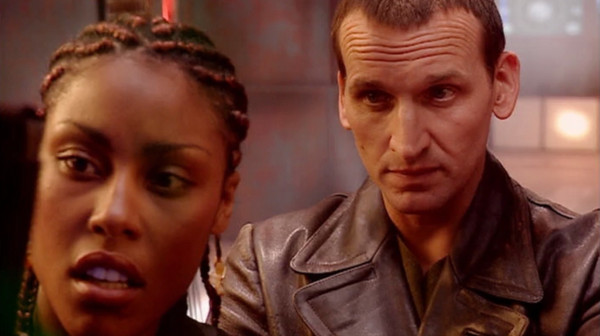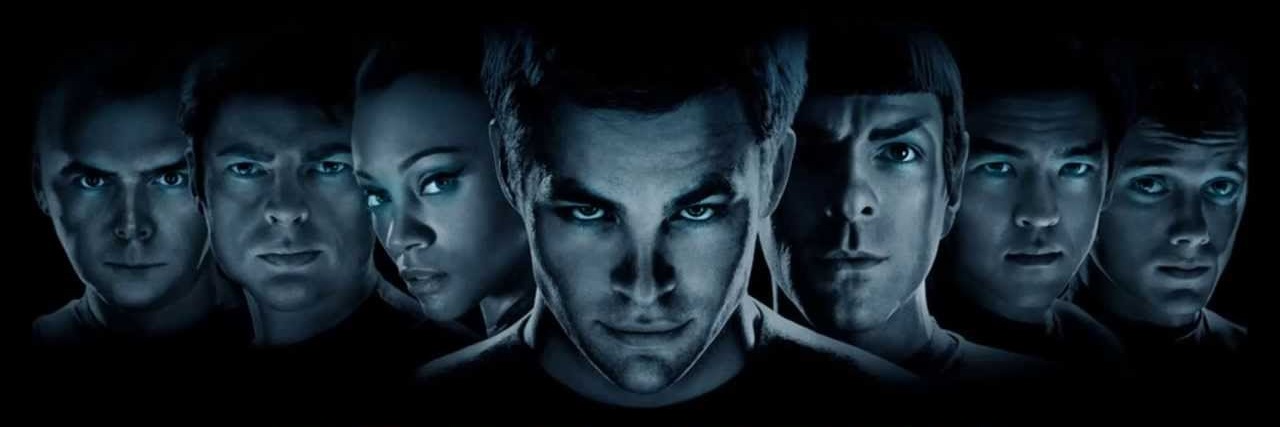“The Long Game,” written by Russell T Davies and directed by Brian Grant, takes the Doctor, Rose, and newly-acquired companion Adam (episode 6: Dalek) to Satellite 5, a space station in the year 200,000 that broadcasts news across the entire human empire.
DOCTOR: The Fourth Great and Bountiful Human Empire. Planet Earth is at its height, covered with megacities, five moons, population 96 billion, the centre of a galactic domain that stretches across a million planets and species.
Straight away, the Doctor smells something fishy on Satellite 5 (not literally). It is the hub for all news communication to the human empire, and yet it seems regressive both technologically and ideologically. He postulates that humanity is approximately 90 years off evolutionary course–a prediction as well as confirmed by the information that Satellite 5 began broadcasting 91 years previous.
The Doctor’s main curiosity is that the “news” station is filled with reporters who are so focused on themselves (everyone wants to be promoted to floor 500: where the “walls are made of gold”) they don’t notice that the world around them doesn’t quite make sense. He realizes this in his interactions with journalist Cathica: As he grills her about life on Satellite 5, she reveals that not only does she not have any coherent answers, but she’s never even pondered basic facts about her environment.

DOCTOR: I give up on you Cathica. Now, Rose. Look at Rose. Rose is asking the right kind of question.
ROSE: Oh, thank you.
DOCTOR: Why’s it so hot?
CATHICA: One minute you’re worried about the Empire and the next it’s the central heating!
DOCTOR: Well, never underestimate plumbing. Plumbing’s very important.
On Satellite 5, we come face to face with an attitude familiar in our current culture: Life is about money, power, promotion—in short, the self. Worry about you and no one else. Get what you can and the rest be damned. Our villain in “The Long Game” affectively uses humanity against itself, manipulating it into stunting its own evolution. How? By nurturing the lie that the only thing that matters is individual comfort and advancement.
The result of self-focus is the atrophy of the whole. Consider 1 Corinthians 12, which uses the metaphor of the body to talk about community. “The way God designed our bodies is a model for understanding our lives together as a church: every part dependent on every other part…involved in the hurt, and in the healing. If one part flourishes, every other part enters into the exuberance” (The Message, v. 25-26). Although this specifically refers to the church, we can see the same principal at work in our cities, states, countries, world: if one person neglects their role or hogs resources, other parts of the body suffer.
It’s easy to let ourselves off the hook about the state of our communities—we’re not bad people, right? We love our children. We pay our taxes. We recycle. Likewise, the people working Satellite 5 are not presented as sinister or malicious. But they are passive, keeping their heads down and doing their duty for the singular hope of personal reward. In this lack of larger awareness, the work of their hands is easily manipulated to enslave the human race. This would seem to suggest that it’s not enough to do the minimum, only aware of what directly affects our lives. Perhaps it’s not too off-base to say that even if we aren’t paying attention to the big picture, “someone else” is (whether in the physical or spiritual realm).
“The Long Game” contains a familiar element in Doctor Who (and one of my favorite things about the show): The Doctor challenging people to be their best selves. This sometimes requires unfiltered ridicule on his part, but almost always means inciting heroic acts for the good of something greater than Self. The Doctor models this selflessness. Though sometimes he could be called rude, surly, indifferent, or reckless, it cannot be denied that he often finds himself in life-threatening situations in order to save people from monsters.
The Doctor is in Cathica’s face about her indifference, not forcing her to help him, but forcing her to really look at her self and her world. Because of this, she ends up single-handedly defeating the villain and saving the Doctor and Rose. This act requires of her the willingness to be aware and the courage to act.

The presence of the Doctor tends to magnify qualities that already exist in his companions. Sadly, these qualities are not always good. Russell T. Davies originally submitted the script of “The Long Game” to Doctor Who in the ‘80s. In part, it was an experiment with the concept of a failed companion. While the Doctor, Rose, and Cathica are tangled in a sinister plot, TARDIS newbie Adam is sneaking around the satellite trying to acquire technology that he can profit from in his own time and place. While Cathica’s selfless choices save our heroes, it is Adam’s selfish choices that put them in danger in the first place (he gives the villains vital information about the Doctor and Rose and it leads to their capture). When Adam is found out, the Doctor kicks him out of the TARDIS, saying that he “only travels with the best.” Beyond this consequence of his actions, we briefly glimpse that Adam experiences even further punishment that has nothing to do with the Doctor but is merely the result of his own actions.
All in all, this episode is an interesting look at the power the individual has on their broader world. It asks some intriguing questions about our responsibility within that context, and all while giving us a shiny new world to explore—complete with imaginative tech, gross monsters, and a fabulous performance by Simon Pegg.



